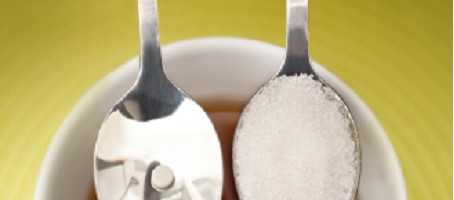A study into mice and humans has shown consumption of artificial sweeteners to be linked with higher blood sugar levels as a result of changes in gut bacteria.
Previous studies have shown consumption of artificial sweeteners via ‘diet’ soft drinks to be linked with increased rates of type 2 diabetes, however, results of studies have been inconsistent and therefore no clear picture has emerged as to whether or not artificial sweeteners have a part to play in the development of diabetes.
Researchers from Israel have looked to establish whether a link may exist in a more direct fashion and one that involved feeding mice, and then humans, very large doses of artificial sweeteners.
To begin with, the researchers fed mice with three artificial sweeteners, aspartamen, saccharin and sucralose and measured their blood glucose levels. Following treatment with antibiotics to normalise levels of gut bacteria, the blood sugar levels of the mice reverted back to normal.
The next test involved taking gut bacteria from mice following feeding with saccharin and transferring this gut bacteria to mice without gut bacteria. The researchers noted that these mice that received the gut bacteria developed high blood sugar levels.
These tests showed strong links between sweeteners and changes in gut bacteria and also that it is the gut bacteria that was responsible for the raised blood glucose levels. The researchers carried out further analysis and showed that the mice fed on saccharin were breaking down more carbohydrate from their diet than would normally be the case.
The researchers next turned their attention to the effects in humans. The first test involved monitoring sweetener intake, gut bacteria, weight and level of glucose intolerance in 400 people. The results showed that people who consumed the highest amounts of artificial sweeteners had significantly different gut bacteria to people who consumed little amounts of sweeteners and these people also had increased glucose intolerance.
The next test involved giving people doses of sacchari, the maximum weekly dose recommended for the sweetener. This would be equivalent to having around 2 litres of artificially sweetened drinks per day. This part of the trial was conducted in seven people and, by the end of the week, four out of the participants had developed high blood glucose levels and had changes in gut bacteria matching the changes observed in mice.
Finally, the researchers transferred gut bacteria of the humans used in the large saccharin dose trial into mice lacking gut bacteria and, again, these mice developed hyperglycemia as a result.
The fact that a key part of the study involved only seven participants means that further research will be needed to show more conclusive evidence. The other argument in favour of sweeteners is that only saccharin was tested in detail. The research by the Israeli scientists could prompt further analysis into the effects of regular artificial sweetener consumption.
What's new on the forum? ⭐️
Get our free newsletters
Stay up to date with the latest news, research and breakthroughs.




